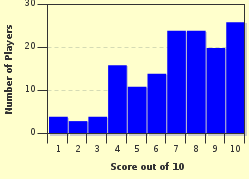Quiz Answer Key and Fun Facts
1. What year was hanging abolished in Great Britain?
2. In 1955 the last woman was hanged in Britain. Who was she?
3. Which German city is famous for the trials and executions of many of the major Nazi war criminals?
4. The last public hanging in England took place on 26th May 1868: it was that of Michael Barrett for the Fenian (Irish Nationalist) bombing in Clerkenwell which killed seven people. Where was he hanged?
5. What was the nickname of William Joyce who was hanged for treason in 1946?
6. Who was the Australian bushranger, famous for his distinctive homemade armour, who was hanged in 1880?
7. Which highway robber, hanged at York in 1739, had a horse called Black Bess?
8. When did the last hanging take place in Great Britain?
9. Who was hanged for the well documented murders discovered at 10 Rillington Place, Notting Hill, London?
10. Which English judge, particularly active in the reign of James II, was known as the "hanging judge"?
Source: Author
ironhammer
This quiz was reviewed by FunTrivia editor
bloomsby before going online.
Any errors found in FunTrivia content are routinely corrected through our feedback system.


